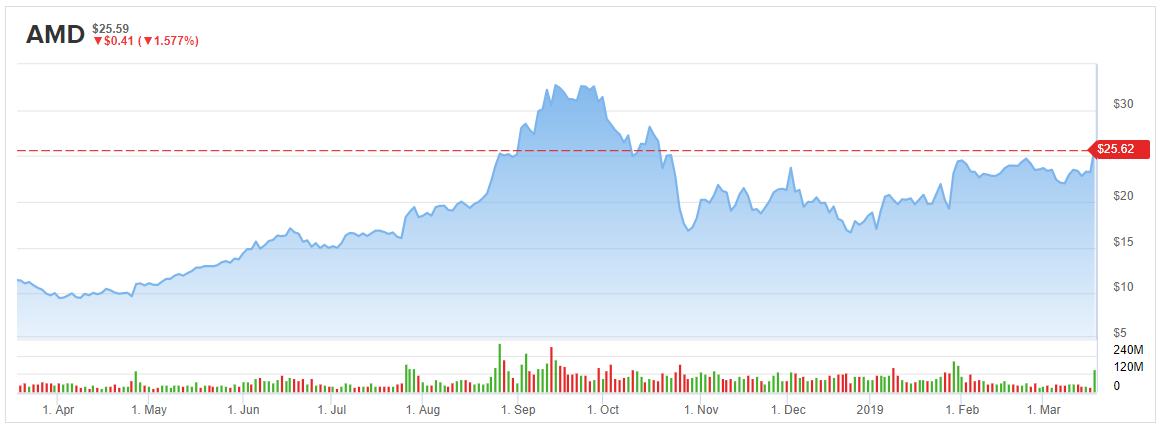Advanced Micro Devices (AMD) jumped substantially on Tuesday’s trading session, as an un-expected customer, Alphabet (GOOG) is expected to purchase a lot of GPUs from AMD in anticipation of its launch for its video game streaming platform called “Stadia,” which they announced yesterday.

Now, historically AMD has held onto a dominant position in the mainstream console gaming segment ever since the launch of Jaguar (chip codename family) for both the Xbox One and PlayStation 4 platform. Hence, the volume segment of the gaming market (where most people play games) is pretty much owned by AMD, and Nvidia has shifted to PC performance gaming, datacenter algorithms, and AI (mainly autonomous vehicles).
It seems Google is leveraging its entire OS and Web Ecosystem to deploy a new product or service, which establishes a new gaming platform. The challenges with this model are numerous, because at best it helps establish a new market opportunity, but really, only on the condition that the streaming platform grows to a significant installed base of active users, which is difficult to anticipate.
Historically, Google wasn’t a video gaming company, but in recent years they have moved into the gaming segment slowly, but mostly because of the lucrative mobile gaming opportunity across its Android Installed base, whereby it usually collects its tollbooth like fees for mobile game purchases and in-game purchases as well. In this very specific case, the mobile gaming business has matured, and it’s probably why Alphabet entered into the high-end gaming segment.
There are some challenges to Stadia in the near-term, as the game catalogue and the costs of running the hardware becomes ambiguous. How much do subscribers have to pay for both the streaming and video game titles? A lot of money goes into the development of AAA game titles (this isn’t mobile game development), so with costs hovering in the hundreds of millions for game production, it’s not as easy to develop a bulk-content-subscription model like Netflix does for movies and TV shows and Spotify for music artists. The video game is the product, and it’s hard to recoup the cost of development absent of a definitive license model.
Most of the major game publishers report sales in terms of digital downloads or physical disc purchases, and they’ve been able to retain this pricing structure whereas movie studios are more dependent on movie ticket sales than ever before (mainly because movie licensing deals to streaming companies aren’t as lucrative).
So, the biggest uphill challenge for Google’s streaming platform comes from the difficulty of getting buy-in from game publishers that have aged gaming franchises that people would actually play. Now, when gamers joke about the evil greed of Electronic Arts (EA) and Activision Blizzard (ATVI), they’re not lying. Electronic Arts is moving to own more of its distribution, and the same could be said for Activision Blizzard.
It’s likely that gamers would have to pay a subscription for Stadia, and then buy games separately from an online store. This doesn’t necessarily score the same mainstream opportunity as Netflix, as the cost of content licenses and hosting movies on servers is a lot less than trying to rent computing hardware from the cloud to run compute intensive games, and then charge gamers for games separately.
In this case, most customers are wedded to their respective gaming consoles and have already bought games, so with the implicit investment into hardware and games, why would they migrate to a separate platform and pay subscription fees for renting cloud hardware and buy games when they can stick with Xbox Live or PlayStation Network? It could be an overlapping opportunity, but right now, the silver lining isn’t quite clear.
How does this translate for AMD?
A major datacenter customer, i.e. Google moved the stock significantly yesterday. Since Google buys much of its hardware from Intel and Nvidia it does score some points for AMD. But, in terms of financial impact, it’s not likely that the current gaming ecosystem would ditch the pre-existing gaming platforms for a new service with a limited game library.
It’s a very entrenched segment of the market. AMD investors should anticipate Sony and Microsoft to make major announcements in 2019 and 2020 for PlayStation 5 and Xbox 2 (or whatever it’s named).
The next generation consoles will likely run on AMD hardware anyway, and the incremental opportunities with Stadia could mature into something more meaningful by 2025 to 2035, but not in an immediate timeframe that would be very incremental to earnings or sales.
Furthermore, Stadia was barely announced yesterday (with launch expected sometime in 2019). To build-up an established gaming franchise that would actually demand the purchase of AMD GPUs at scale in a Google datacenter could take many years. It’s good that AMD won the contract, as it provides an added hedge in the event enthusiast gaming does migrate to streaming, but it certainly won’t happen overnight.
There’s plenty to like about AMD the stock as an investor, but the news yesterday was mostly incremental and won’t impact sales or earnings by much in a 12-month or 24-month window.